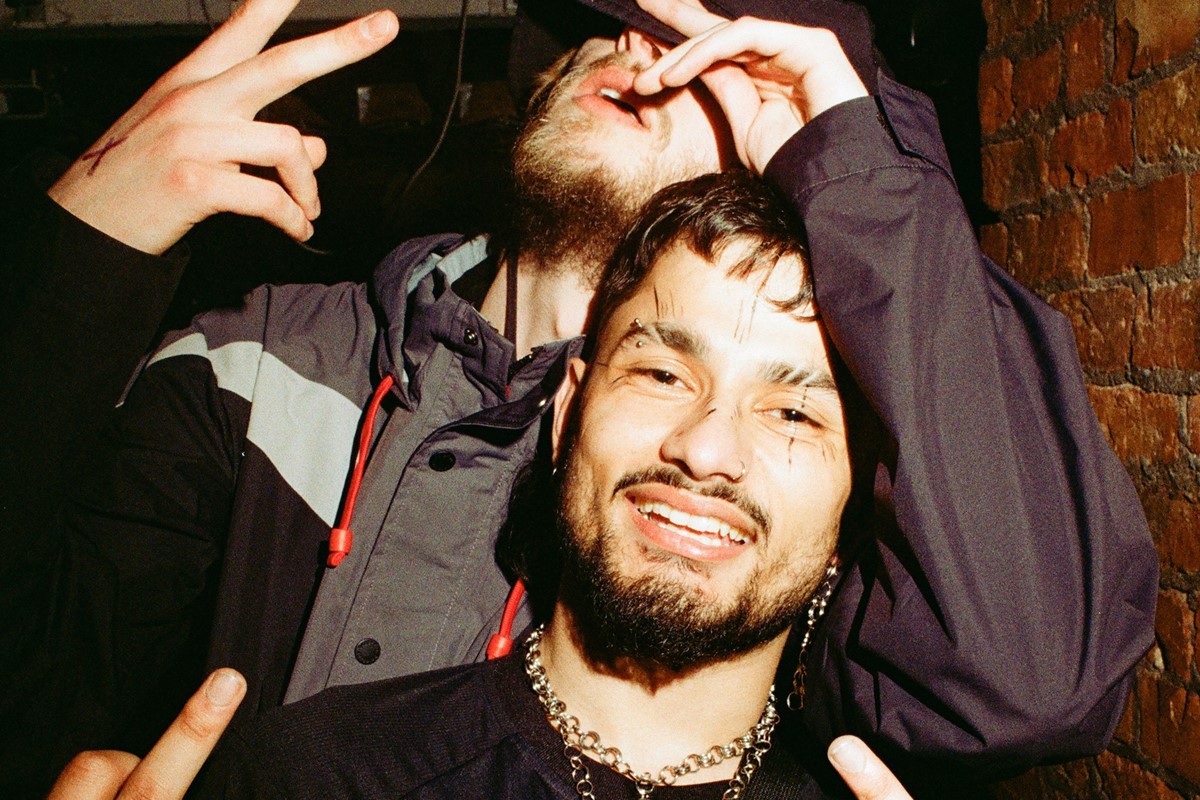Northern Nasties queer rave fashion27 Images
“We’re Northern and we’re the radgies of the queer scene,” says Immy about her club night Northern Nasties, which she founded in Manchester in May 2023. Though it may only be a baby, Northern Nasties is rooted in the history of the North-east, inspired by the iconic Sunderland nightclub the New Monkey, founded in 1999. It was through the New Monkey that Britain was introduced to makina, a trance-infused techno subgenre that made its way over the Mediterranean from Spain. Though the New Monkey eventually closed in 2006, its impact on the Northern rave scene was indelible, still influencing night’s like Immy’s in 2025.
At Northern Nasties’ most recent edition, apart from having a “riot of a party”, attendees are there to celebrate their Northern, working-class and queer roots – and one of the ways they did this was through fashion. On the night, the self-proclaimed radgies wore adidas tracksuits while swigging from Sports Direct mugs, and donned Newcastle football strips while having a fag in the smoking area.
“The fashion of working-class people of the 2000s is our style,” Immy tells me. “Think Y2K, tracksuits, football shirts, loud make-up and fake Burberry caps. Clothes you can dance in and don’t mind getting sweaty in.” Elsewhere, the night’s attendees plucked from an array of style subcultures too, with punky metal spikes, New Romantic make-up and the Day-Glo of New Rave appearing throughout. “A lot can be learned about a night from the style and fashion of their patrons,” says Immy. “Having a scene surrounding a club night creates a community of people who, one way or another, relate to each other. Fashion and attitude are intertwined with the concept of the scene.”
Below, we chat to organisers Immy and Ali about the ethos of the Northern Nasties, why fashion is important to club nights, and reclaiming stereotypes of working-class Northerners.

First of all, what was the inspiration behind starting Northern Nasties?
Ali: The New Monkey, working-class clubbing culture, and the queer origins of makina.
Immy: Ever since I was a teenager, I’ve always been obsessed with makina and North-east MCs at The New Monkey. Growing up in Newcastle, it was a huge part of my culture and I can associate many of my best memories with this music. There was no makina outside of the North-east, so when I moved to Manchester I wanted to bring a piece of my culture I’m proud of. I was fed up with posh events playing generic music and felt uncomfortable in these spaces due to the amount of classism present. I therefore decided the best way to combat this was to create an event which put our Northern, working-class queerness to the forefront, ergo Northern Nasties.
What’s the story behind the name?
Immy: I needed something snappy, which summed us up. We’re Northern and we’re the radgies of the queer scene. Northern Nasties is our own as working-class people, uninfluenced by a wave of posh people who continue to gentrify Manchester. It’s queer reclamation. It empowers us and helps us to be proud of our Northern culture, instead of masking our identities for the sake of ‘civilised society’.
Ali: I started helping out with Northern Nasties around the second or third event. Immy, who founded the night, had already put the name out there. To me, it feels like a reclamation, and the alliteration just works. It is a space where you can be a Northern nasty, not just in the way southerners stereotype us, but in how we dress, rave, and own it. Trampy, skanky, chavvy, whatever people call it, we embrace it.
Do you ever worry that people could take the irony in the name out of context?
Ali: Not really, because it’s not ironic. That is kind of the point. We are taking back that perception and making it our own. If someone takes it too seriously, they are probably in the wrong place. It is also a fun contrast to the idea of Southern softies.
Immy: There’s no irony in it at all. In the same way we reclaimed the word queer, we’re reclaiming stereotypes of working-class Northerners and celebrating it in the face of continued oppression from our government. We embody our event name in our day-to-day life.
You can look incredible in a tracksuit or just duct tape. We don’t hold someone’s value to the price tag of their clothes – Immy
How would you describe the style of the people who come to the night? Was there a specific dress code, or did the fashion develop organically?
Ali: Eclectic, unapologetically Northern, football casual kitsch, queer DIY – and it happened naturally. People picked up on our early 2000s New Monkey inspired flyers, and because Immy had previously managed Partisan, a queer-led venue, there was never a strict dress code. It was always about self-expression. Over time, though, certain trends have emerged. At our last event, we noticed loads of people turning up in football shirts, which was funny because me and Immy always match in Newcastle tops since she is from there.
Immy: The fashion of working-class people of the 2000s is our style. We encourage the individuality of every person who comes to our events, and the diversity we see makes us proud of what we represent. Think Y2K, tracksuits, football shirts, loud makeup and fake Burberry caps. Clothes you can dance in and don’t mind getting sweaty in.
Why do you think fashion and style are important to club nights in general?
Ali: They reflect the crowd, or sometimes they do not, which makes it even more interesting. The confusion and mystery of it all is part of the fun.
Immy: Attendees represent events, and a lot can be learned about a night from the style and fashion of their patrons. Having a scene surrounding a club night creates a community of people who one way or another relate to each other. Fashion and attitude are intertwined with the concept of the scene in my opinion. You can look incredible in a tracksuit or just duct tape. We don’t hold someone’s value to the price tag of their clothes. Nights out give us an opportunity to be honest, but performative.

Why is your slogan ‘Northern, Working Class and Queer’ important to the ethos of the event?
Ali: Makina was originally a queer genre. Drag queens in Spain performed it in gay bars before it was embraced by working-class MCs in the North-east. That history really resonated with both me and Immy. We have grown up experiencing classism firsthand, and even trying to start a Northern night in the North as Northerners has been tough. There is a lot of infiltration and gentrification from Southerners in these spaces.
Immy: Our ethos dictate our event and we would be nothing with it. We not only embody queer riot, but also working-class culture, the things ignorant narratives stereotype us as, we reclaim and make our own in an inclusive, welcoming environment. This ethos is cultivated in our event and has no tolerance for any kind of discrimination or classism.
What makes Northern Nasties different from other club nights?
Ali: We put class at the forefront of our manifesto, something that is often missing from other events. We want Northerners to feel proud and comfortable in the North, which might sound strange since we are based in Manchester. But the reality is, there are a lot of rich Southerners in these spaces. People mock our accents, style, humour and way of life despite choosing to live and party here. Some even go as far as hiding their class. Northern Nasties is about reclaiming space, not just for queerness but for working-class Northern identity too.
Immy: Northern Nasties is authentic. Our multifaceted event separates us from the monotony and stagnation within the current Manchester/Salford club scene. We’re not trying to be something we’re not, we have no facade, we don’t care for enormous profits or booking famous headliners. We are above everything else, poor queer Northerners and we have a riot of a party at Nasties.


